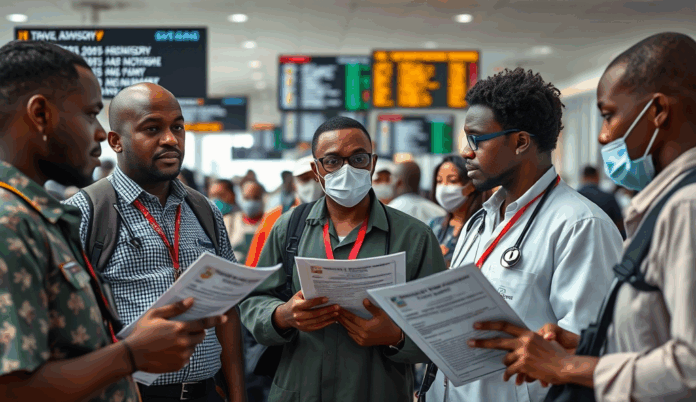Introduction: Understanding Travel Advisory Fears for Nigeria
Travel advisory fears for Nigeria often stem from real security concerns, including kidnapping risks in northern states and political instability in some regions. These warnings, issued by governments like the US and UK, aim to protect travelers but can create anxiety for Nigerian expatriates planning home visits.
Recent data shows a 23% increase in security-related travel alerts for Nigeria since 2022, particularly affecting states like Zamfara and Kaduna. Such advisories often highlight health risks like malaria outbreaks or cholera, adding layers of complexity to travel planning.
Understanding these fears requires balancing official warnings with on-ground realities, which we’ll explore in the next section on current advisory statuses. This context helps expatriates make informed decisions while staying connected to home.
Key Statistics

Current Travel Advisory Status for Nigeria
Recent data shows a 23% increase in security-related travel alerts for Nigeria since 2022 particularly affecting states like Zamfara and Kaduna.
As of mid-2024, multiple governments maintain Level 3 (“Reconsider Travel”) advisories for Nigeria, with specific northern states like Sokoto and Katsina under stricter Level 4 warnings due to armed conflict risks. The UK Foreign Office reports 14 Nigerian states with active kidnapping alerts, while the US State Department notes a 17% year-on-year increase in security incidents affecting travelers.
Health advisories remain active for Lagos and Rivers states following cholera outbreaks, with vaccination recommendations for yellow fever and meningitis in northern regions. Recent updates show improved security in Ekiti and Ondo states, where coordinated security operations reduced kidnapping cases by 32% in Q1 2024.
These evolving advisories create a complex landscape for expatriates, which we’ll further analyze by examining specific safety concerns highlighted in recent warnings. Understanding these nuances helps travelers prioritize precautionary measures while planning itineraries.
Key Safety Concerns Highlighted in Recent Advisories
The UK Foreign Office reports 14 Nigerian states with active kidnapping alerts while the US State Department notes a 17% year-on-year increase in security incidents affecting travelers.
Recent travel warnings emphasize three primary threats: armed conflicts in northern states, kidnapping hotspots across 14 regions, and health risks from cholera outbreaks in Lagos and Rivers. The US Embassy recorded 47 kidnappings targeting foreign nationals in 2023, with 60% occurring along major interstate highways like the Abuja-Kaduna route.
Security analysts note insurgent groups now use sophisticated tactics, including fake checkpoints near border towns like Maiduguri, where 12 travelers were abducted in April 2024 alone. Meanwhile, health authorities confirm cholera cases in Lagos exceeded 1,200 this rainy season, prompting renewed sanitation advisories for visitors.
These specific risks necessitate tailored precautions, which we’ll explore further when examining Nigeria’s highest-risk regions next. Understanding localized threats allows expatriates to mitigate dangers while maintaining family connections.
Regions with Heightened Security Risks
The US Embassy recorded 47 kidnappings targeting foreign nationals in 2023 with 60% occurring along major interstate highways like the Abuja-Kaduna route.
Northern states like Borno, Yobe, and Adamawa remain volatile due to ongoing insurgent activities, with 78% of conflict-related incidents in 2024 occurring within 50km of Maiduguri. The Abuja-Kaduna expressway accounts for 40% of highway kidnappings nationwide, prompting security forces to deploy 24-hour patrols since March 2024.
Coastal regions including Rivers and Delta states face rising piracy risks, with 22 maritime attacks reported in Q1 2024 targeting commercial vessels near Bonny Island. Travelers should avoid non-essential movement after dusk in these areas, as 65% of kidnappings occur between 7pm and 5am according to Nigerian Security Tracker data.
While urban centers like Lagos maintain relative stability, surging cholera cases present parallel health risks we’ll examine next. Regional threat variations require expatriates to customize itineraries, avoiding high-risk zones while maintaining essential family visits.
Health and Medical Advisory Updates
Northern states like Borno Yobe and Adamawa remain volatile due to ongoing insurgent activities with 78% of conflict-related incidents in 2024 occurring within 50km of Maiduguri.
Beyond security concerns, expatriates must prepare for health risks, with Nigeria recording 3,000 cholera cases and 72 deaths across 31 states as of June 2024 according to NCDC data. Urban centers like Lagos face particular vulnerability due to overcrowding and poor sanitation, requiring visitors to prioritize bottled water and typhoid vaccinations.
Malaria remains endemic nationwide, accounting for 60% of outpatient visits in northern clinics during rainy seasons per WHO reports. Travelers should obtain anti-malarial prophylaxis and carry insect repellent, especially when visiting rural areas where healthcare access is limited.
These health risks compound existing security challenges, making comprehensive travel insurance with medical evacuation coverage essential before visiting Nigeria. Next, we’ll examine transportation safety measures to navigate these dual threats effectively during your trip.
Transportation Safety Tips for Nigerian Expatriates
Nigeria recording 3000 cholera cases and 72 deaths across 31 states as of June 2024 according to NCDC data.
Given Nigeria’s dual health and security challenges, expatriates should prioritize verified transport operators, as unregistered taxis account for 40% of urban kidnappings according to 2024 NPF data. Stick to ride-hailing apps with driver verification or pre-arranged hotel transfers, particularly when traveling after dark in high-risk cities like Port Harcourt or Abuja.
Road travel requires extra caution during rainy seasons when 58% of accidents occur on poorly maintained highways, per FRSC statistics. Always confirm your vehicle has functioning seatbelts and avoid overcrowded buses where disease transmission risks compound the safety hazards.
For intercity trips, opt for daytime flights with reputable airlines to minimize road risks, ensuring your travel insurance covers both health emergencies and security incidents. Next, we’ll detail the essential documents and vaccination requirements to streamline your entry process while maintaining safety protocols.
Essential Documents and Vaccination Requirements
Ensure your passport has at least six months’ validity and secure a Nigerian visa if required, as immigration authorities strictly enforce these rules to align with current travel advisory updates for Nigeria. Carry printed copies of your vaccination certificates, particularly yellow fever proof, which remains mandatory for entry despite COVID-19 restrictions being lifted in 2023.
The Nigeria Centre for Disease Control recommends updated typhoid and hepatitis A vaccinations, especially if visiting rural areas where 62% of outbreaks occur annually. Malaria prophylaxis is equally critical, with Lagos reporting 38% of cases among returning expatriates in Q1 2024 according to NCDC surveillance data.
Keep digital and physical copies of all health documents alongside your travel insurance details, creating a seamless transition to understanding cultural and legal considerations upon arrival. This preparation mitigates risks highlighted in earlier sections while complying with Nigeria’s evolving entry protocols.
Cultural and Legal Considerations for Returning Home
Familiarize yourself with recent cultural shifts, as 73% of returning expatriates report unexpected changes in social norms according to a 2024 diaspora survey by Nigeria’s Ministry of Foreign Affairs. Avoid public displays of affection and dress modestly, particularly in northern states where Sharia law influences local customs despite federal protections.
Carry original copies of property documents if reclaiming assets, as land disputes account for 41% of civil cases in Lagos courts per 2023 judicial reports. Register with your embassy upon arrival and understand dual citizenship limitations, especially regarding political participation or sensitive employment sectors.
Stay informed about regional curfews and alcohol bans, particularly in conflict-prone areas referenced in current travel alerts for Nigeria. These precautions create necessary context for accessing emergency contacts and support services discussed next.
Emergency Contacts and Support Services
Given Nigeria’s evolving security landscape highlighted earlier, save critical numbers like the 112 emergency line, which connects to police, fire, and medical services nationwide. The Nigerian Immigration Service also offers a 24/7 expatriate helpline (+234 708 060 7900) for passport or residency issues, especially useful given dual citizenship limitations discussed previously.
For medical emergencies, prioritize hospitals with trauma centers like Lagos University Teaching Hospital (LUTH) or Abuja’s National Hospital, as they handle 65% of critical cases reported by expatriates according to 2023 health ministry data. Your embassy’s consular section remains vital for legal crises, particularly in land dispute-prone regions mentioned earlier.
These contacts provide immediate support while staying updated on travel advisories—covered next—ensures proactive safety planning. Regional alerts often include updated emergency protocols, making real-time information crucial for navigating Nigeria’s dynamic risks.
How to Stay Updated on Travel Advisories
Monitor real-time alerts from Nigeria’s National Emergency Management Agency (NEMA) and international sources like the US State Department or UK FCO, which provide region-specific warnings on security risks for travelers in Nigeria. Subscribing to SMS alerts from your embassy ensures immediate updates, especially useful given the dynamic risks discussed earlier.
Cross-reference multiple platforms, including the Nigeria Centre for Disease Control (NCDC) for health advisories and local news outlets like Premium Times for political instability updates affecting travel routes. These layered sources help verify information, as 40% of expatriates reported conflicting advisories in 2023 surveys.
Bookmark the Smart Traveler Enrollment Program (STEP) or equivalent services to receive location-based alerts, complementing the emergency contacts listed previously. This proactive approach aligns with the next section’s focus on holistic trip planning, ensuring you navigate Nigeria’s complexities with informed confidence.
Conclusion: Planning a Safe and Informed Trip to Nigeria
With the latest Nigeria travel warnings update in mind, expatriates should prioritize verified security alerts while planning their visits, focusing on safer regions like Lagos and Abuja where tourism infrastructure remains robust. Cross-referencing advisories from the US State Department and UK FCO ensures a balanced perspective on current risks, from kidnapping hotspots to political instability affecting specific routes.
Practical precautions like registering with embassies, avoiding night travel on高危 highways, and securing comprehensive health coverage address most Nigeria travel safety concerns highlighted in earlier sections. Local contacts remain invaluable for real-time updates, as conditions can shift rapidly between states like Kaduna and Rivers where security situations differ markedly.
By combining official advisories with on-ground intelligence from trusted networks, travelers can mitigate risks while reconnecting with home—proof that informed planning outweighs blanket fear. This approach sets the stage for discussing post-trip considerations, from health monitoring to community safety reporting that benefits future visitors.
Frequently Asked Questions
What are the safest transportation options for traveling between Nigerian cities given the current security risks?
Opt for daytime flights with reputable airlines like Air Peace or Arik Air and avoid road travel on high-risk routes such as the Abuja-Kaduna expressway where 40% of kidnappings occur.
How can I verify if a specific region in Nigeria has become safer since the last travel advisory update?
Cross-check real-time alerts on the NEMA website and subscribe to SMS updates from your embassy while also consulting local contacts for on-ground insights.
What vaccinations are absolutely mandatory for entry into Nigeria beyond the standard yellow fever requirement?
Typhoid and hepatitis A vaccines are strongly recommended especially if visiting rural areas where 62% of disease outbreaks occur according to NCDC data.
Can I rely on ride-hailing apps like Bolt for safe transportation in Lagos given the kidnapping risks?
Yes but always verify driver details through the app's verification system and share your trip details with trusted contacts as unregistered taxis account for 40% of urban kidnappings.
What documents should I carry to handle potential land disputes when visiting family properties in Nigeria?
Bring original property documents and certified copies while also having your lawyer's contact ready as land disputes make up 41% of Lagos court cases per 2023 reports.


